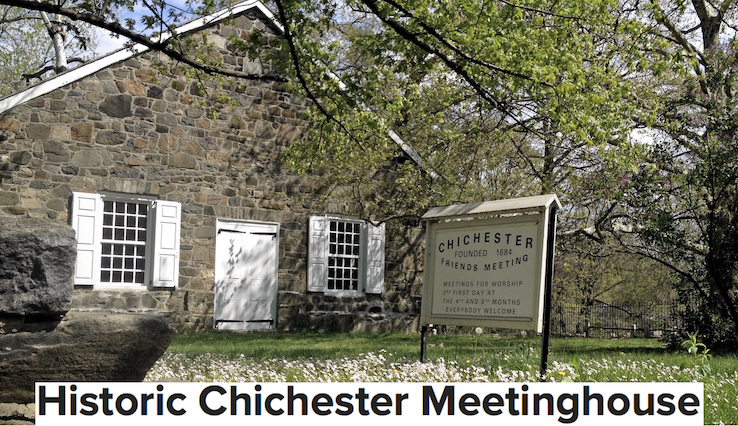According to the Quaker genealogist Gilbert Cope’s 1871 book Genealogy of the Dutton Family of Pennsylvania, in 1682 John and Mary Dutton of Overton, near Chester, England, purchased a 500-acre portion of the original William Penn Charter lands and shortly afterwards emigrated from England and built a home there. The Richard Dutton (1711-1795) who is believed to have been the major contributor to the rebuilding of Chichester Meetinghouse after a fire in 1768 and whose initials “RD” and the date 1769 are engraved in a stone at the roof line was a grandson of John and Mary Dutton. I am descended from this Richard Dutton through his son (1747 or 1748-1820) and grandson (1784-1861), both named Jonathan. My great-grandfather, Frank Dutton (1849-1924), a grandson of the younger Jonathan, married Martha Beeson (1853-1924), the daughter of Amor Beeson (1828-1889), a Methodist preacher, and Frank and Martha became active members of Mount Hope Methodist Church in Aston and were buried in its cemetery. Since then, Duttons descended from Frank have been Methodists, although they have been aware of, appreciative of and interested in their Quaker heritage: for example, signatures in the Chichester Meetinghouse register book show that as late as 1950 my grandfather, Lawrence Amor Dutton (1880-1967), his brother Elmer G. Dutton and his sister Louisa Dutton Hall (Mrs. L. Norris Hall) and their spouses all attended a meeting together at Chichester, and my parents named me Richard Dutton knowing the association of my ancestor of the same name with the Meetinghouse.
My father, Aubrey Whiteley Dutton (1910-1997), was born in a farmhouse that had been built by Frank Dutton in the 1870s near the present-day intersection of Routes 322 and 452. As the area become more commercial in the years just before World War I, my grandfather sold the farm and moved with his family to what was then a pretty suburban area of Brooklyn, New York, where one of his brothers-in-law, an inventor and patternmaker originally from the Wilmington area, taught at Pratt Institute. The farmhouse was later used as an office by a trucking company and was ultimately torn down within only the past decade or two. An even older Dutton house nearby with an ancient beehive chimney had been torn down not much earlier to make way for self-storage units. Except for streets in the area bearing the Dutton name, there is no remaining trace of the Duttons in Upper Chichester or vicinity except for the preservation of Richard Dutton’s initials on the upper part of the Meetinghouse wall and many gravestones in the adjoining cemetery containing the well-worn names of various family members. - Richard Dutton
